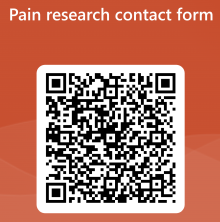Clinical Studies
Are you ready to participate in one of our studies?
If you are 18 years of age or older, click here to access the contact form.
Or scan the adjacent QR code on a phone or tablet.
Êtes-vous prêt à participer à l’une de nos études ?
Si vous avez 18 ans et plus, veuillez cliquer ici to accéder au formulaire.

Our current studies:
Quebec Low Back Pain Core Study (QLBP Core) and Quebec Low Back Pain Biobank (QLBP Biobank)
Low back pain (LBP) is reported by approximately 20% of North Americans, the majority of whom experience both pain and physical impairment. Patients with chronic LBP have an increased utilization of medical services, and higher incidence of lost workdays and long-term disability, representing a significant burden to the healthcare system and the economy.
To better understand why some people recover from acute episodes of pain and/or respond to some treatments while other do not, we have established a province-wide online database for longitudinal studies of individuals with acute and chronic LBP (Core). The Core Database is not only a valuable research tool by itself but can also facilitate recruitment for a series of affiliated projects, including the QLBP Biobank, where biological samples are collected. The collection of biological samples (i.e. blood samples and saliva) from people suffering with LBP and from healthy controls will allow the investigation of genetic, epigenetic, and proteomic markers that are linked to LBP diagnosis, prognosis, and treatment.
This study has been reviewed and approved by the Research Ethics and Compliance (IRB) committee of the Faculty of Medicine of McGill University (protocol number: NUMBER: A08-M23-18A).
Post-operative chronic pain and problematic opioid use
The majority of patients recover well after surgery. However, pain is common after surgery and opioid medications may be prescribed for the relief of pain. A subset of patients may also experience persistent pain symptoms and may continue to use opioids for a prolonged period of time. In some patients, the prolonged use of opioids may lead to opioid use problems. It is important to better understand why some patients experience persistent pain and opioid use problems after surgery so that these problems can ultimately be prevented.
The main objective of this study is to examine the factors that contribute to persistent pain and problematic opioid use after surgery. To do so, we will examine if certain molecular and psychosocial factors are associated with an increased risk of persistent pain and opioid use problems after surgery. Examining the extent to which molecular and psychological factors are associated with chronic pain and/or problematic opioid use after surgery will help us develop targeted treatments for patients who undergo surgery and to ultimately prevent the occurrence of these problems.
For this study we are recruiting at the Hospital Maisonneuve Rosemont and at the Centre Hospitalier de l’Université de Montréal individuals, men and women, aged 18 years or older who undergo specific surgeries.
This study has been reviewed and approved by the McGill University Health Center Research Ethics Board (REB) (protocol number: MP-37-2019-5363).
The fibromyalgia study
he purpose of this study is to better understand the causes of fibromyalgia (FM), which is a chronic disorder that is generally characterized by pain that is felt all over various parts of the body. Usually, fibromyalgia is treated by both pharmacological (medicines) and non pharmacological (therapy, exercises, etc.) treatments, while emphasizing that patients themselves play the most important role in their own care by acting to reduce stress, sleep well, and exercise.
There are two specific goals of this study: (1) To identify which genetic, molecular, and immune factions increase the risk of developing FM, and (2) to verify if the level of inflammatory response is different in patients with FM than in members of the “health control group”. This is a case-control study meaning that we are recruiting individuals who have been diagnosed with FM (case), or who are classified as “healthy control”.
This study has been reviewed and approved by the Research Ethics and Compliance (IRB) committee of the Faculty of Medicine of McGill University (protocol number: NUMBER: A05-M50-14B).
